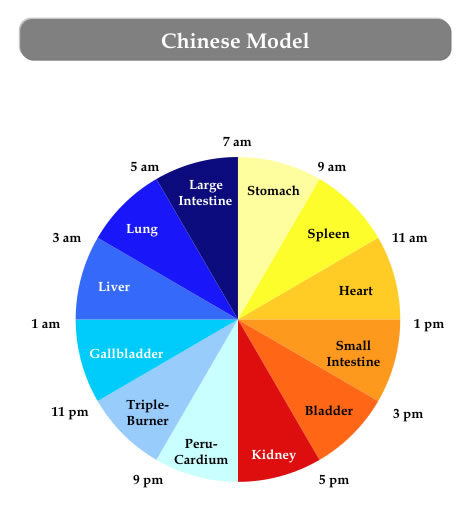The Body-Energy Clock is built upon the concept of the cyclical ebb and flow of energy throughout the body. During a 24-hour period (see diagram that follows) Qi moves in two-hour intervals through the organ systems. During sleep, Qi draws inward to restore the body. This phase is completed between 1 and 3 a.m., when the liver cleanses the blood and performs a myriad of functions that set the stage for Qi moving outward again.
In the 12-hour period following the peak functioning of the liverfrom 3 a.m. onwardenergy cycles to the organs associated with daily activity, digestion and elimination: the lungs, large intestine, stomach/pancreas, heart, small intestine. By mid-afternoon, energy again moves inward to support internal organs associated with restoring and maintaining the system. The purpose is to move fluids and heat, as well as to filter and cleanseby the pericardium, triple burner (coordinates water functions and temperature), bladder/kidneys and the liver.
Lessons Based on the Body Clock
When one organ is at its peak energy, the organ at the opposite side of the clock, 12 hours away, is at its lowest ebb. For example, between 1-3 a.m., the liver reaches its peak, doing its work to cleanse the blood, while the small intestine, the organ responsible for the absorption and assimilation of many key nutrients, is at its ebb. What does this tell us? Principally, that it must be taxing to the system to deal with late night meals and snacking. The body is not programmed to accommodate the modern habit of late-night screen-based stimulation and the eating habits that go with it. When we eat late at night, food is not well absorbed by the small intestine and the liver has little opportunity to do its job of housekeeping.
The idea, then, is to try when you can to plan daily activity around an organ systems peak energy, while avoiding actions that can tax a system when its energy is at its lowest ebb. Think of lifestyle habits you might modify in order to better synchronize your systems energy ebbs and flows:
- Lungs: With the lungs at their peak energy in the early morning, you might want to schedule aerobic exercise at this time rather than later in the day. And, if you must speak through the long work day, presentations given earlier in the day benefit from greater lung energy. Laryngitis can set in late afternoon when lung energy is depleted .
- Large Intestine: To get the day off to a good start, give yourself enough time early in the morning to honor the normal elimination function of the large intestine.
- Stomach/Pancreas/Small Intestine: Try to eat heavier meals early in the dayat breakfast when the stomach is at its peak, and at lunch, to catch Qis expanding/warming energy as it crests at midday. Eating larger meals of the day early delivers nourishment to the small intestine when it is strongest, which aids absorption and assimilation.
- Kidneys: The kidneys are aligned with the adrenals, the glands that produce cortisol to help us spring out of bed in the morning. Early morning, from 5 a.m.-7 a.m., is when kidney energy is weakesta reason that people with depleted kidney energy often have trouble waking up to a new day.
- Liver: The liver stores and cleanses the blood, a fact that becomes more interesting as we consider personal experience. Have you ever partied too much in the evening, and awakened in the wee hours of the morning feeling off and unable to fall back to sleep? Chances are good that you were tossing and turning between the hours of 1 a.m. and 3 a.m. when your alcohol over-loaded liver was struggling to do its work.The timing of the livers peak activity also speaks to consuming the last meal of the day as early as possible. The livers daily programming assumes an early dinner and bedtime. Before electricity and the light bulb, people ate supper and retired early, allowing time for the last meal of the day to digest so that the liver could be most effective in its peak hours of activity.The work shift of the liver, then, reinforces the concept of making the last meal of the day a light one that is consumed on the early side. The more time that passes after food is eaten before peak activity of the liver, the better the liver will be able to carry out its myriad of functions.
